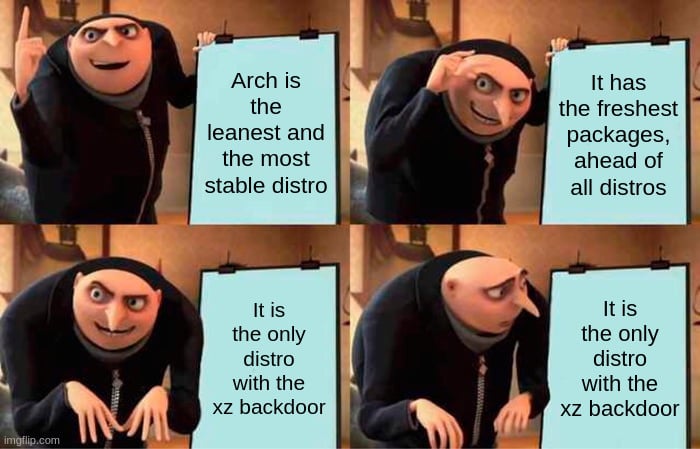this post was submitted on 30 Mar 2024
473 points (84.3% liked)
linuxmemes
27511 readers
823 users here now
Hint: :q!
Sister communities:
Community rules (click to expand)
1. Follow the site-wide rules
- Instance-wide TOS: https://legal.lemmy.world/tos/
- Lemmy code of conduct: https://join-lemmy.org/docs/code_of_conduct.html
2. Be civil
- Understand the difference between a joke and an insult.
- Do not harrass or attack users for any reason. This includes using blanket terms, like "every user of thing".
- Don't get baited into back-and-forth insults. We are not animals.
- Leave remarks of "peasantry" to the PCMR community. If you dislike an OS/service/application, attack the thing you dislike, not the individuals who use it. Some people may not have a choice.
- Bigotry will not be tolerated.
3. Post Linux-related content
- Including Unix and BSD.
- Non-Linux content is acceptable as long as it makes a reference to Linux. For example, the poorly made mockery of
sudoin Windows. - No porn, no politics, no trolling or ragebaiting.
4. No recent reposts
- Everybody uses Arch btw, can't quit Vim, <loves/tolerates/hates> systemd, and wants to interject for a moment. You can stop now.
5. 🇬🇧 Language/язык/Sprache
- This is primarily an English-speaking community. 🇬🇧🇦🇺🇺🇸
- Comments written in other languages are allowed.
- The substance of a post should be comprehensible for people who only speak English.
- Titles and post bodies written in other languages will be allowed, but only as long as the above rule is observed.
6. (NEW!) Regarding public figures
We all have our opinions, and certain public figures can be divisive. Keep in mind that this is a community for memes and light-hearted fun, not for airing grievances or leveling accusations. - Keep discussions polite and free of disparagement.
- We are never in possession of all of the facts. Defamatory comments will not be tolerated.
- Discussions that get too heated will be locked and offending comments removed.
Please report posts and comments that break these rules!
Important: never execute code or follow advice that you don't understand or can't verify, especially here. The word of the day is credibility. This is a meme community -- even the most helpful comments might just be shitposts that can damage your system. Be aware, be smart, don't remove France.
founded 2 years ago
MODERATORS
you are viewing a single comment's thread
view the rest of the comments
view the rest of the comments

i think it’s a matter of perspective. if i’m deploying some containers or servers on a system that has well defined dependencies then i think Debian wins in a stability argument.
for me, i’m installing a bunch of experimental or bleeding edge stuff that is hard to manage in even a non LTS Debian system. i don’t need my CUDA drivers to be battle tested, and i don’t want to add a bunch of sketchy links to APT because i want to install a nightly version of neovim with my package manager. Arch makes that stuff simple, reliable, and stable, at least in comparison.
"Stable" doesn't mean "doesn't crash", it means "low frequency of changes". Debian only makes changing updates every few years, and you can wait a few more years before even taking those changes without losing security support while Arch makes changing updates pretty much every time a package you have installed does.
In no way is Arch more stable than Debian (other than maybe Debian Unstable/Sid, but even then it's likely a bit of a wash)
If you are adding sources to Debian you are doing it wrong. Use flatpak or Distrobox although distrobox is still affected